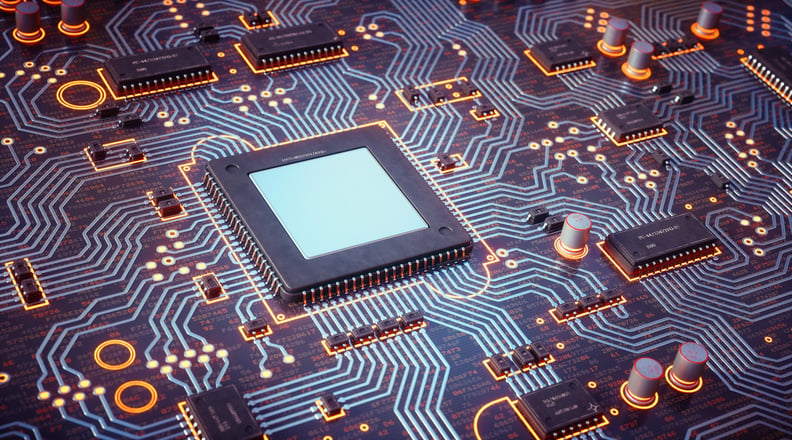Financial PCBs 101: PCB Design For Trading Platforms
Driven largely by technological advancements and the increasing demand for efficient trading solutions, the financial technology landscape is...

PCBs are crucial to modern financial systems and play a critical role in the infrastructure that supports the global financial ecosystem. These small, compact circuit boards are found in a wide range of devices and systems integral to the daily operations of banks, financial institutions, and capital markets.
The role of PCBs in the financial infrastructure is crucial, as they provide the foundational technology that supports the secure, reliable, and efficient operation of financial market systems. As the financial industry continues to evolve and adopt new technologies, the importance of PCBs will only grow, ensuring the stability and resilience of the global financial ecosystem.
Multiple areas of finance require durable and reliable PCBs as part of their efficient processing needs. These areas include:
An ATM contains a mainboard, which handles memory and connects all other parts. Meanwhile, an I/O board handles the communication between the Internet and the processor within the device.
Server PCBs are also found in credit/debit card readers, enabling secure and reliable payment processing at physical store locations. For both ATMs and credit/debit card readers, the PCB must be:
Want to learn more about the types of PCBs and the PCB assembly process? Consider these blogs from our resource library:
Online banking platforms, stock trading systems, and financial data centers also utilize PCBs to facilitate transactions. These also require durable PCBs that will last and provide reliability during quick and repetitive transactions.
Point-of-sale (POS) terminals, the devices used to process card payments at retail locations, are built around PCBs that handle transaction data, authentication, and communication with payment networks.
A business relies on its POS to handle transactions and provide access to accounting software and online sales channels in any location. These systems are required to be versatile and accept various payment types, including chips and pin payments, and be able to communicate with smartphones and smartwatches to facilitate payment without any physical connection.
Mobile payment systems, such as digital wallets and contactless payment technologies, utilize PCBs to enable seamless and secure transactions on the go. These systems are necessary to connect to the Internet wirelessly in any environment and provide reliable data and complete transactions even when jostled or otherwise compromised.
PCBs are also important to the systems that track, monitor, and analyze financial data for regulatory compliance purposes, such as:
These specialized PCBs ensure the reliability, security, and integrity of data that underpins the financial industry's regulatory and compliance frameworks.
Both fraud detection and AML measures require multiple verification checks (including AVS and CVV), machine learning algorithms and other tools to flag any suspicious transactions, and close monitoring for any sign of irregular patterns or velocity changes. This helps reduce the chances of payment fraud and the hassle for both business and customer alike.
Stock exchanges, clearing houses, and other critical financial market infrastructures rely on PCBs to power the complex trading platforms, settlement systems, and data processing capabilities that enable the efficient functioning of global financial markets.
In the world of HFT, every microsecond counts. Latency, the time it takes for a signal to travel from one point to another, can mean the difference between a profitable trade and a missed opportunity. High-frequency trading systems, which execute financial transactions at lightning-fast speeds, are built on PCBs that provide the necessary computing power and low-latency connectivity. Low-latency connectivity features include:
These design techniques help minimize the time it takes for market data to be received, processed, and traded, enabling HFT firms to capitalize on fleeting market opportunities.
The financial industry requires extremely reliable PCBs to ensure the continuous and uninterrupted operation of critical systems, such as banking, payment processing, and trading platforms. Redundancy is crucial, as downtime or system failures can have significant financial and reputational consequences.
Redundant systems and failover mechanisms must be built into the PCB design to maintain business continuity in the event of a failure. Secure data storage, encryption, and access control measures also must be integrated into the PCB design to safeguard critical information. Manufacturers must also adhere to industry-specific regulations and standards, such as the Payment Card Industry Data Security Standard (PCI DSS), to ensure the security of financial data.
Financial systems often have extended lifespans, requiring PCBs to be maintained and upgraded over time to keep pace with evolving technologies and changing requirements. PCB manufacturers must ensure that their designs are modular and scalable, allowing for easy maintenance, component replacements, and upgrades without disrupting the overall system.
The financial industry is increasingly focused on sustainable practices and minimizing its environmental footprint. With that in mind, PCB manufacturers must address the environmental impact of their production processes, including the use of hazardous materials, energy consumption, and waste management. Adoption of eco-friendly manufacturing techniques, such as the use of lead-free solder, recycling of materials, and energy-efficient production facilities, is becoming a critical requirement for the financial industry.
PCBs play a critical role in the smooth and secure operation of various financial systems and services, enabling the electronic transactions and payments that are the core of the banking and finance industry. They power the circuitry in Automated Teller Machines (ATMs), facilitating cash withdrawals and account management.
PCBs also underpin the high-speed trading platforms and data processing systems that are essential for the functioning of global financial markets. PCBs are also integral to financial regulations, cybersecurity measures, and fraud prevention mechanisms, ensuring the integrity and reliability of the financial system as a whole.
Learn more about PCB assembly:

Driven largely by technological advancements and the increasing demand for efficient trading solutions, the financial technology landscape is...

PCBs for kiosks represent a specialized area within electronics manufacturing, requiring a focus on durability, security, and diverse component...

In the digital age, where transactions are often completed with a mere tap or click, the seamless operation of financial systems has become a...